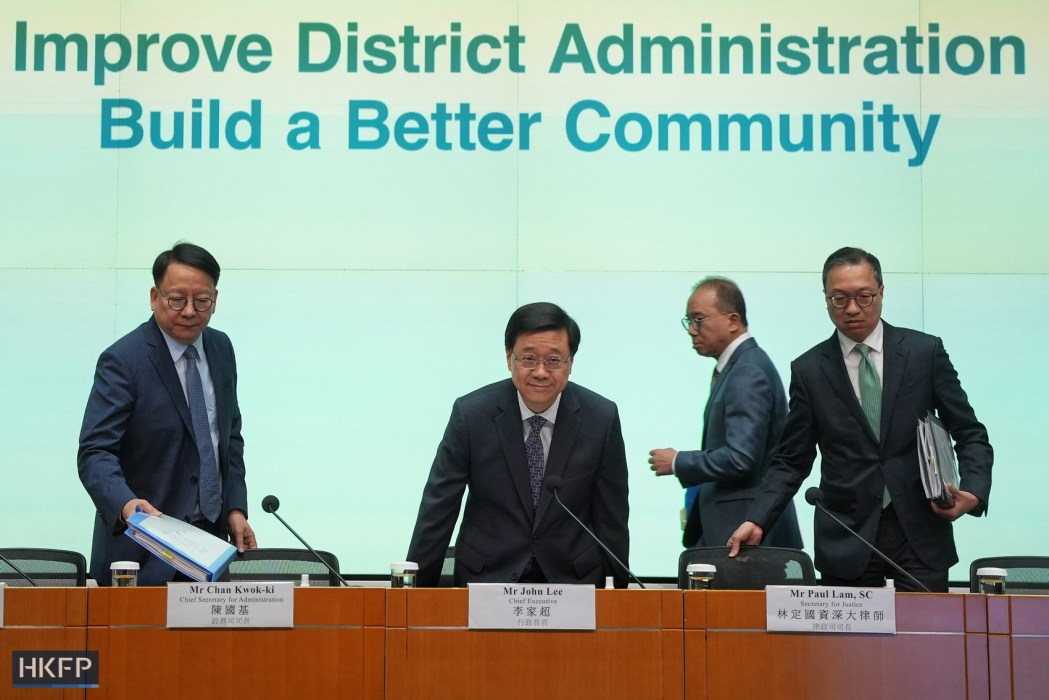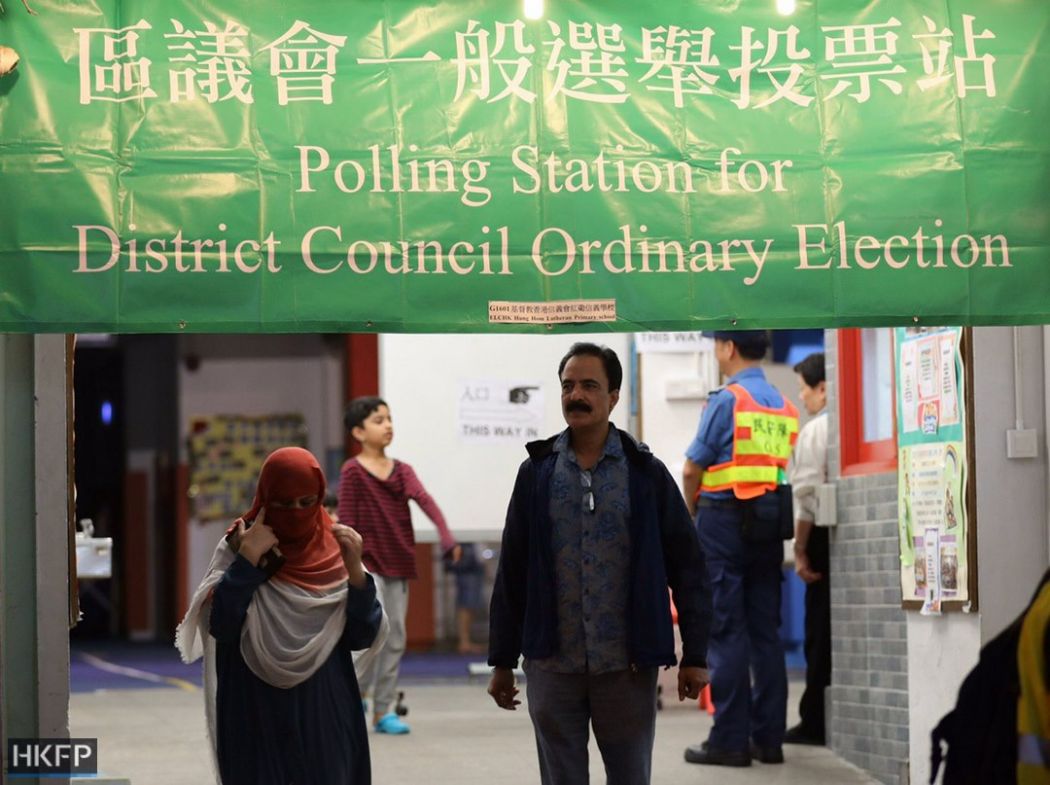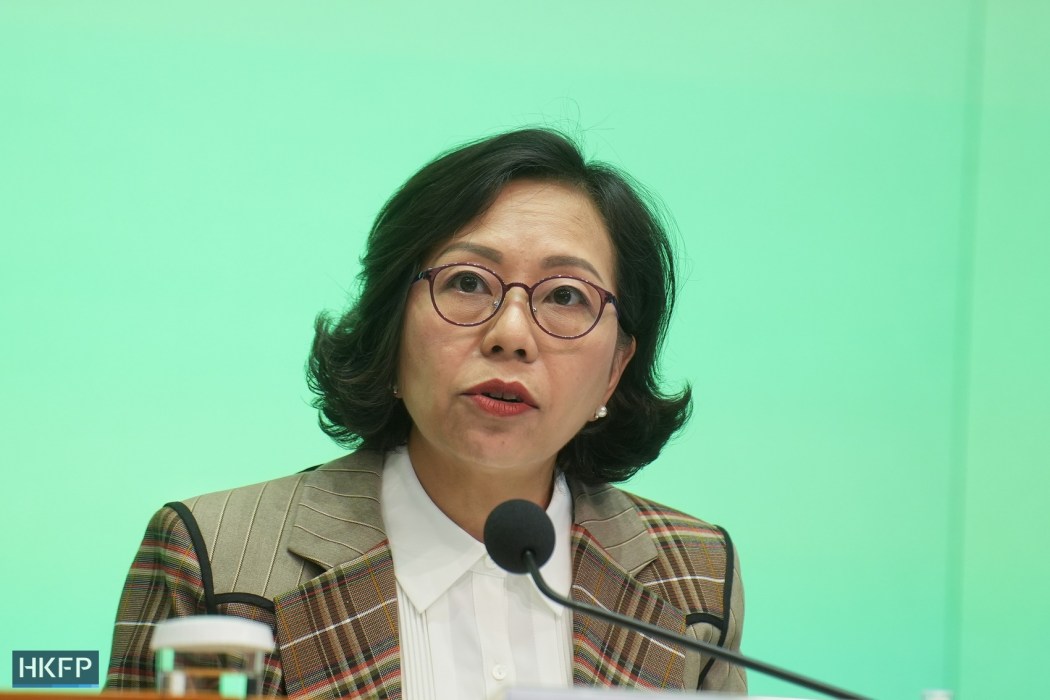The number of District Council seats democratically chosen by the public are to be slashed to around 20 per cent, Chief Executive John Lee announced on Tuesday. Pending legislative approval, candidates will also be put through national security background checks and a new nomination system, following a landslide by the pro-democracy camp in the last polls in 2019.

According to the government’s proposed changes, only 88 seats in the polls scheduled for November will be directly elected by the public – down from 452 in the last poll. The number of overall seats will fall from 479 to 470.
The election constituency boundaries will also be redrawn, allowing two representatives to be elected in each constituency, while each voter may only vote for one candidate. The total number of constituencies will be reduced from 452 to 44.
Aside from the 88 seats voted on by the public, 179 will be appointed by the chief executive – a system that was previously abolished in 2016. The 27 ex-officio seats will remain.
The new District Councils will be chaired by the District Officer, a government official. The system is similar to the arrangement during the colonial-era.

The rest – 176 seats – will be produced through elections within the District Fight Crime Committees, District Fire Safety Committees and Area Committees of each district. Each member of each committee is chosen by the government’s Home Affairs chief.
“The black riots and Hong Kong version of a colour revolution in 2019 were a warning for Hong Kong,” Lee said on Tuesday. “We must plug all the loopholes in the system to prevent the District Councils from again becoming a platform for [advocating] black riots, Hong Kong independence and mutual destruction. We must prevent those who opposed China and stirred up chaos in Hong Kong from hijacking, manipulating, paralysing the District Councils.”
Lee was sat in front of a backdrop reading “Improve District Administration Build a Better Community.”
Vetted candidates
In order to run for the upcoming poll, candidates must now secure at least three nominations from each of the three committees, on top of nominations from voters in their own constituencies.

Candidates will also have to undergo background checks to ensure only “patriots” can govern Hong Kong, a principle laid out by Beijing when they overhauled the city’s electoral system in 2021.
The proposal will be tabled at the Legislative Council. Ming Pao cited sources as saying that the government expected the legislative work to be completed before July, in order for the election to be carried out in late November or early December.
The government’s move came after pro-democratic candidates secured a landslide victory in the last District Council election in 2019, when the city was gripped by large-scale, months-long protests and unrest.
Composition of District Boards/District Councils since 1982
| 1982 – 1985 | 1985 – 1988 | 1988 – 1991 | 1991 – 1994 | 1994 – 1997 | 1997 – 1999 | 2000 – 2003 | 2004 – 2007 | 2007 – 2011 | 2011 – 2015 | 2015 – 2019 | 2019 – 2023 | 2023 – 2027 | |
| Gov’t officials | 166 | — | — | — | — | — | — | — | — | — | — | — | — |
| Appointed members | 135 | 132 | 141 | 140 | — | 468 | 102 | 102 | 102 | 102 | — | — | 179 |
| Elected members | 132 | 237 | 264 | 274 | 346 | — | 390 | 400 | 405 | 412 | 431 | 452 | 88 |
| Ex-officio members | 57 | 57 | 27* | 27 | 27 | — | 27 | 27 | 27 | 27 | 27 | 27 | 27 |
| Members from three committees | — | — | — | — | — | — | — | — | — | — | — | — | 176 |
| Total | 490 | 426 | 432 | 441 | 373 | 468 | 519 | 529 | 534 | 541 | 458 | 479 | 470 |
However, the majority of them resigned in July 2021 following media reports that the government would require them to take oaths, and repay their wages and subsidies if disqualified.
District Council monitoring
Though the Basic Law stipulates that the district councils are consultative bodies for the government or responsible for providing district administration services, Lee said the government planned to set up a mechanism to monitor councillors who “failed the public’s expectations.”
Secretary for Home and Youth Affairs Alice Mak said in the same press meeting that investigations could be launched at the request of a District Council’s chairperson – which would be an official under the proposed change – or a motion passed by the council. The council members in question could appeal to the chief secretary for administration if they disagreed with the probe’s outcome.

The Home and Youth Affairs Bureau will also make a list of “negative behaviours” in its upcoming guidance on District Councillors’ conduct, Mak added.
Colonial-era arrangement
When Lee was asked by a journalist if the government lacked confidence in that the number of democratically-elected members would be lower than in colonial times, he said: “I do not agree that pure[ly] counting election votes means democracy.”

Lee said what the colonial administration introduced was “in some way to create a situation which is incompatible with the Basic Law,” as the city’s mini-constitution states that the role of the local councils was “for consultation and to render services.”
Lee said different places had their own systems, adding that “it cannot be a good system” if the end result was “disastrous” or resulted in “bad administration” for constituents.
‘A step backwards’
At a Labour Day rally on Monday, the pro-democracy League of Social Democrats chair Chan Po-ying said any cut in democratically-elected seats at the District Councils would “absolutely [be] a step backward.”

“If [the government] scraps the only official system in Hong Kong elected via popular vote, then we wonder how citizens’ voices can be reflected,” Chan said, as the District Councils were the only representative body whose majority was produced by democratic elections.
Last week, ex-chief executive Leung Chun-ying said it was not necessary for Hong Kong to hold elections to appoint district-level administrators, whilst pro-Beijing heavyweight Rita Fan said the previous pro-democracy landslide made her “very afraid,” and publicly-elected seats must be slashed for the city’s “self-protection.”
Most opposition figures are now behind bars, have fled the city, or have quit politics.
Support HKFP | Policies & Ethics | Error/typo? | Contact Us | Newsletter | Transparency & Annual Report | Apps
Help safeguard press freedom & keep HKFP free for all readers by supporting our team

latest national security stories























